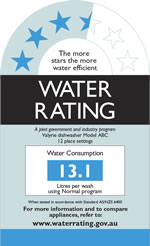In this Canstar Blue cost analysis, we explore how much it costs to run a dishwasher in your home. We take into account electricity and water costs by state, energy efficiency ratings and place setting capacity.
Dishwashers are staple appliances in most Australian kitchens, but do they contribute to higher than expected electricity bills? While dishwashers undoubtedly save time, the question of how much a dishwasher costs to run remains a hot topic. Canstar Blue has crunched the numbers to work out the real cost of running your dishwasher.
How much does a dishwasher cost to run?
The cost of electricity makes up the largest portion of dishwasher expenses, costing between 11.9c and 26.8c on average, per load. The amount of electricity used will depend on the size of the dishwasher (measured in place settings), as well as the energy efficiency star rating.
Average electricity usage cost of a dishwasher
| Place Setting Capacity | 1 to 3 Star Energy Rating | 3.5 to 4.5 Star Energy Rating |
|---|---|---|
| 6 to 9 | 16.7c | 11.9c |
| 10 to 12 | 23.2c | 16.8c |
| 13 to 16 | 26.8c | 21.5c |
Source: www.canstarblue.com.au – 12/09/2024. Average energy consumption figures based on dishwashers listed in the Commonwealth of Australia E3 Program’s Registration database, which assumes seven uses per week at the ‘normal’ setting. Electricity usage cost estimates based on the average electricity usage rate of 32.0 c/kWh. Average electricity usage rates are based on single-rate, non-solar only plans on Canstar’s database, available for an annual usage of 4,373 kWh. Water usage cost estimates based on the average water usage rate of $3.43 / kL. Average water usage rate based on ABS Water Account statistics (2021-22).
What’s the cost of water in a dishwasher?
On average, households can expect to pay between 2.7c and 4.0c per load when it comes to water usage costs, according to Canstar Blue’s calculations.
The amount you actually pay for water usage however, will depend on the size and efficiency of your dishwasher as well as the rates in your area. To find out how much water your appliance may be using per load, it may be helpful to check the water efficiency star rating label. In the example pictured right, it shows a 3.5 star rating for a dishwasher that uses 13.1 litres of water per load – relatively standard for a dishwasher.
Below, we’ve calculated the average water usage costs of a dishwasher by place setting capacity. These costs have been determined based on an average water usage rate of $3.43/kL.
Average water usage cost of a dishwasher
| Place Setting Capacity | Water Usage Cost |
|---|---|
| 6 to 9 | 2.7c |
| 10 to 12 | 3.6c |
| 13 to 16 | 4.0c |
Source: www.canstarblue.com.au – 12/09/2024. Average energy consumption figures based on dishwashers listed in the Commonwealth of Australia E3 Program’s Registration database, which assumes seven uses per week at the ‘normal’ setting. Electricity usage cost estimates based on the average electricity usage rate of 32.0 c/kWh. Average electricity usage rates are based on single-rate, non-solar only plans on Canstar’s database, available for an annual usage of 4,373 kWh. Water usage cost estimates based on the average water usage rate of $3.43 / kL. Average water usage rate based on ABS Water Account statistics (2021-22).
Which state or territory has the cheapest dishwasher running costs?
In addition to calculating the average dishwasher power consumption cost, Canstar Blue has calculated the average cost per load for households in each capital city across Australia.
Average dishwasher running costs (water and electricity) per load, by capital city (12 – 14 place settings)
| Capital City | Electricity Costs | Water Costs | Total Cost Per Load |
|---|---|---|---|
| Sydney | 24.6c | 3.1c | 27.7c |
| Melbourne | 17.7c | 4.7c | 22.4c |
| Brisbane | 23.8c | 1.1c | 24.9c |
| Adelaide | 32.0c | 3.7c | 35.7c |
| Perth | 23.0c | 3.1c | 26.1c |
| Hobart | 20.3c | 1.4c | 21.7c |
| Darwin | 21.2c | 2.5c | 23.7c |
| Canberra | 20.7c | 2.9c | 23.6c |
Source: www.canstarblue.com.au – 12/09/2024. Average energy consumption figure of 727 W per load based on dishwashers listed in the Commonwealth of Australia E3 Program’s Registration database, which assumes seven uses per week at the ‘normal setting. Average electricity usage rates are based on single-rate, non-solar only plans on Canstar’s database, available for an annual usage of 4,373 kWh. Water usage cost estimates based rates obtained from service provider websites: 2.67$/kL in NSW per Sydney Water, 4.0437$/kL in VIC per Great Western Water, 0.915$/kL in QLD per Urban Utilities, 3.214$/kL in SA per SA Water, 2.667$/kL in WA per Water Corporation, 1.2186$/kL in TAS per TAS Water, 2.1987$/kL in NT per Power and Water, $2.56/kL in ACT per Icon Water. Average water usage rate of 11.5L per load based on data from Canstar’s databases. Average electricity usage rates are based on single-rate, non-solar only plans on Canstar’s database, available for an annual usage of 4,373 kWh. Electricity usage cost estimates based on average electricity usage rates: 33.9 c/kWh in Sydney, 24.4 c/kWh in Melbourne, 32.7 c/kWh in Brisbane, 44.0 c/kWh in Adelaide, 31.6 c/kWh in Perth, 27.9 c/kWh in Hobart, 29.2 c/kWh in Darwin, 28.5 c/kWh in Canberra.
From the data we can see that households in Adelaide are likely to feature the highest overall dishwasher running costs. Alternatively, homes in Hobart will typically see the highest savings on their dishwasher utility costs. Melbourne, Darwin and Canberra follow closely behind, boasting fairly cheap overall dishwasher power consumption costs.
Remember, these calculations should be treated as a general guide. The actual cost of running a dishwasher will likely fluctuate depending on the model in use, energy efficiency rating, water and electricity rates in your area and the settings used for your appliances.
Paying too much for power? Compare cheap electricity plans below
Running your home dishwasher may not cost as much as you thought per load, but if you’re still on a dud energy plan, you could be paying much more than you need to. Below are some of the cheapest plans in New South Wales, Victoria, south-east Queensland and South Australia according to our database. Are you missing out on additional savings?
Here are some of the cheapest published deals from the retailers on our database that include a link to the retailer’s website for further details. These are products from referral partners†. These costs are based on the Ausgrid network in Sydney but prices may vary depending on your circumstances. This comparison assumes general energy usage of 3900kWh/year for a residential customer on a single rate tariff. Please use our comparison tool for a specific comparison in your area. Our database may not cover all deals in your area. As always, check all details of any plan directly with the retailer before making a purchase decision.
Here are some of the cheapest published deals from the retailers on our database that include a link to the retailer’s website for further details. These are products from referral partners†. These costs are based on the Citipower network in Melbourne but prices may vary depending on your circumstances. This comparison assumes general energy usage of 4000kWh/year for a residential customer on a single rate tariff. Please use our comparison tool for a specific comparison in your area. Our database may not cover all deals in your area. As always, check all details of any plan directly with the retailer before making a purchase decision.
Here are some of the cheapest published deals from the retailers on our database that include a link to the retailer’s website for further details. These are products from referral partners†. These costs are based on the Energex network in Brisbane but prices may vary depending on your circumstances. This comparison assumes general energy usage of 4600kWh/year for a residential customer on a single rate tariff. Please use our comparison tool for a specific comparison in your area. Our database may not cover all deals in your area. As always, check all details of any plan directly with the retailer before making a purchase decision.
Here are some of the cheapest published deals from the retailers on our database that include a link to the retailer’s website for further details. These are products from referral partners†. These costs are based on the SA Power network in Adelaide but prices may vary depending on your circumstances. This comparison assumes general energy usage of 4000kWh/year for a residential customer on a single rate tariff. Please use our comparison tool for a specific comparison in your area. Our database may not cover all deals in your area. As always, check all details of any plan directly with the retailer before making a purchase decision.
The bottom line on dishwasher power consumption
The question of how much it costs to run a dishwasher is difficult to settle because several factors come into play: dishwasher efficiency and size, frequency of use, water heater type, preferred dishwashing temperature and more.
Many Aussies are adamant that washing dishes by hand is cheaper, after all – muscle power is free. However, washing dishes by hand may use considerably more water than most dishwashers, especially now with so many models introducing eco and energy/water efficient settings. While the water itself isn’t very expensive, the cost of heating the water certainly adds up, especially if you constantly run water or refill your sink several times when doing the dishes.
According to Sustainability Victoria, every extra star on an energy efficient dishwasher can save an additional 30% on running costs. If your dishwasher is old, inefficient or unnecessarily large, then it may well work out that washing dishes by hand is the cheaper option (albeit more burdensome). Generally speaking, an energy efficient dishwasher will be cheaper than washing dishes yourself.
If you’re in the market for a new dishwashing appliance, be sure to check out some of Canstar Blue’s best-rated dishwashers.
Original article by Kelseigh Wrigley



Share this article